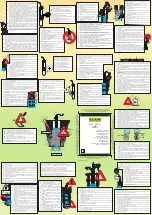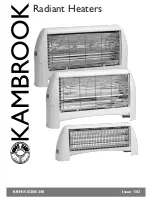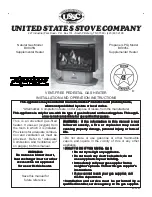
INSTALLATION
SECTION 3
13
Minimum Heights from Roof to Base of Flue Terminal
For all installations, please refer to the table below for calculating requirements. Detailed
recommendations for the air supply are given in BS 5440 Part 2, BS 6644 Clause 19 and
IGE/UP/10 Pt1.
The following notes are provided for general guidance only.
Ventilation shall prevent the heater environment from exceeding 32ºC (90ºF).
The purpose provided space in which the heater(s) are installed must have permanent air vents
communicating directly with the outside air, at high and low level. Where communication with the
outside air is possible only by means of high level air vents, ducting down to floor level for the lower
vents must be used.
For an exposed building, air vents must be fitted on at least two sides, preferably on all four sides.
Air vents should have negligible resistance and must not be sited in any position where they are likely
to- be easily blocked or flooded, or in any position adjacent to an extraction system which is carrying
flammable vapour.
Grilles or louvres should be so designed that high velocity air streams do not occur within the space
housing the heater(s).
The grilles should have a total minimum free area for the water heater(s) in addition to any other
requirements as follows:-
Where the heater is to be installed in a room the following permanent
ventilation is required:
5cm
2
per kW in excess of 7kW Net for installations up to 54kW Net.
For installations exceeding 60kW the following permanent ventilation is required:
Low Level (inlet)
540cm
2
plus 5cm
2
per kilowatt in excess of 54kW total Net input.
High Level (outlet)
270cm
2
plus 2.5cm
2
per kilowatt in excess of 54kW total Net input.
Where the heater is to be installed in a compartment, permanent air vents are required in the
compartment at high and low level. These air vents must either communicate with a room or
internal space or be direct to outside air.
The minimum effective areas of the permanent air vents required in the
compartment are as follows;-
AIR SUPPLY
AND
VENTILATION
Not within 1.5m (5ft) of a
vertical surface of a
structure
≠
on the roof
Internal Route
On Ridge
Not on Ridge
Pitched
Flat
Pitch
exceeding
45º
Pitch not
exceeding
45º
At or
above
ridge
level
600 mm
(24 in)
above roof
intersection
600 mm
(2 ft)
above roof
intersection
With
parapet
Not
applicable
Without
parapet
250 mm
(10 in)
above roof
intersection
The base of
the terminal
should be
600 mm
(24 in)
above the
level of the
adjacent
roof edge
The base of the
terminal should
be 600 mm
(24 in) above
the level of
the top of the
structure
1m (3.3 ft)
above roof
intersection
1m (3.3 ft)
above roof
intersection
External
Route
Internal
Route
External
Route
Type of Roof
Within 1.5m (5ft) of a
vertical surface of a
structure
≠
on the roof
Air Vent Areas
Position of Air Vents
Air from room or internal space
Air direct from outside
High Level
10cm
2
per kW Net
5cm
2
per kW Net
Low Level
20cm
2
per kW Net
10cm
2
per kW Net
Note:-
Both air vents must communicate with the same room or internal space or must both be
on the same wall to outside air.
Summary of Contents for L24/31
Page 3: ......
Page 5: ......
Page 14: ...INSTALLATION SECTION 3 9 Bulk Storage Vessel Installation Cylinder Installation Fig 3 ...
Page 22: ...INSTALLATION SECTION 3 17 Fig 8 Fig 8a ...
Page 24: ...INSTALLATION SECTION 3 WATER CONNECTIONS 19 Fig 10 Fig 11 ...
Page 27: ...INSTALLATION SECTION 3 WATER CONNECTIONS 22 Fig 14 Fig 15 ...
Page 30: ...INSTALLATION SECTION 3 WATER CONNECTIONS 25 Fig 18 Fig 19 ...
Page 51: ...PARTS LIST AND ILLUSTRATIONS SECTION 9 46 Hi Flo Model L32 143 Hi Flo Models L65 169 L81 251 ...
Page 53: ...PARTS LIST AND ILLUSTRATIONS SECTION 9 48 Hi Flo Models L62 309 L54 399 ...
Page 58: ...NOTES 53 ...
Page 59: ...NOTES 54 ...
Page 60: ......
















































